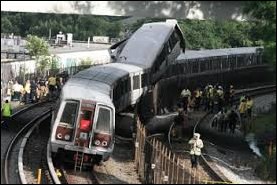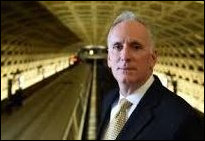 I have relentlessly criticized the Washington Metro system for years, but I have to give credit to management under General Manager Paul J. Wiedefeld for trying to steer the dysfunctional mass transit system in a fiscally sustainable direction. Today’s media reports highlight two straws in the wind.
I have relentlessly criticized the Washington Metro system for years, but I have to give credit to management under General Manager Paul J. Wiedefeld for trying to steer the dysfunctional mass transit system in a fiscally sustainable direction. Today’s media reports highlight two straws in the wind.
First, the Washington Metropolitan Area Transit Authority (MWATA) is trying to revive a plan to redevelop portions of the Huntington Metro campus in Fairfax County, according to the Washington Business Journal. An effort to redevelop a 1.15-acre parcel failed four years ago. But Metro has expanded the project scope to 12 acres.
The selected developer for this larger project would not only design the 12-acre site but also help WMATA determine the need for replacement transit facilities — the three parking garages at Huntington Metro Station had a combined usage rate of 61 percent for fiscal year 2018. WMATA recently closed an 885-space garage on 6 acres located on the south side of the station, where it sees an opportunity for redevelopment if parking demand doesn’t merit replacing.
Heavy-rail transit stations significantly increase the value of adjacent properties. Mass transit systems in other countries employ “value capture” strategies to extract some of that increased value to defray the cost of building and operating their stations. For the most part, Washington’s Metro system has failed to do that. Rather, property owners reaped windfall gains from the public’s massive investment. (A partial exception is taxation of property owners in Tysons to pay for a modest portion of the cost of building the Silver Line extension.) However, Metro frequently did build parking structures around its stations, some of which may be severely under-utilized. The potential exists to redevelop that property in light of market conditions that favor dense, mixed-use development around Metro stations.
Although the WBJ doesn’t frame the story this way, it appears that Wiedefeld is trying to extract maximum value from the limited property Metro does own around the Huntington station. If this redevelopment project is successful, it might be a template for extracting value from other Metro parking lots and garages.
Second, Metro is looking at the potential for privatizing operations of the Silver Line extension encompassing six new stations in the high-tech corridor between Tysons and Dulles International Airport, and beyond. Reports the Washington Post:
On Tuesday, the transit agency issued a request for proposals from private companies willing to perform maintenance and operations on the line extension, which is under construction by the Metropolitan Washington Airports Authority. …
Metro has hinted for the past two years that its intention was to outsource the Silver Line service, suggesting that such a decision could save taxpayers millions of dollars in the long run. In January, the agency issued a “request for information” from potential contractors interested in the job.
Now, Metro says that hiring a private company to fill new Silver Line jobs, rather than adding to the ranks of unionized employees, will help control operating and maintenance costs, “including future pension costs, which have grown to unsustainable levels.”
Wiedefeld said the effort is intended to help the transit agency start “living within our means.” “Competitive contracting is one tool to hold down pension cost growth, while providing quality service for customers.” Laughably, Amalgamated Transit Union Local 689 responded that outsourcing services would result in poor service for riders and subpar maintenance of infrastructure. Worse than the service and maintenance provided by the union workforce? That would be something!
Virginia has boosted its financial commitment to Metro to reduce a massive capital spending shortfall on the understanding that the mass transit authority would undertake meaningful reforms. Wiedefeld is making an honest effort to deliver on that promise, pursuing strategies that were never part of Metro’s past playbook. Whether he succeeds or not is a different question — that depends in large measure upon market conditions and cooperation from Metro’s labor unions. But he’s giving it his best shot.



